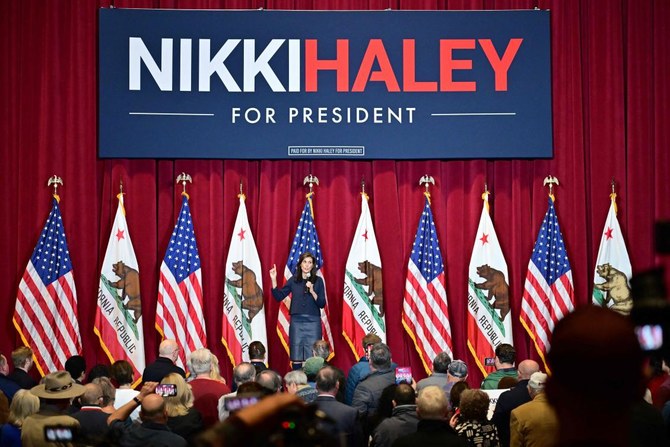Nikki Haley’s presidential campaign on Wednesday brushed off her mortifying defeat in Nevada’s primary and said the former United Nations ambassador would press ahead with her long-shot challenge to former US President Donald Trump.
Haley lost Nevada’s Republican primary handily on Tuesday even though she was the only candidate listed on the ballot. She secured just 31 percent in the contest, well behind the 63 percent of the ballots cast for “none of these candidates,” according to Nevada election officials.
No delegates were at stake in the primary, making Haley’s defeat more symbolic than meaningful. Trump appears poised to capture all of Nevada’s 26 delegates when the state party holds a separate caucus proceeding on Thursday, which will further diminish Haley’s long-term prospects as a candidate.
The Trump campaign made no effort to get people out to vote in the primary, according to Nevada party insiders. Trump at a Jan. 27 rally in Las Vegas told the crowd not to show up for it, but instead focus on the caucuses.
Despite that, almost 44,000 people cast a ballot in the primary for “none” of the candidates, more than double the voters who came out for Haley.
A spokesperson for Haley, Olivia Perez-Cubas, downplayed Haley’s loss, arguing that the process favored Trump.
“Even Donald Trump knows that when you play penny slots, the house wins. We didn’t bother to play a game rigged for Trump,” Perez-Cubas said.
At a campaign event in California on Wednesday evening, Haley pledged to fight on. She told her supporters to gird for a contentious phase of the campaign, and she did not even mention Nevada.
“Just know, I’m not going anywhere,” she said. “I’m in this for the long haul. And this is going to be messy. And this is going to hurt, and it’s going to leave some bruises.”
Haley has focused on winning her home state of South Carolina, where she served for six years as governor. Polls, however, have shown Trump with a commanding lead ahead of the Feb. 24 primary there.
Haley’s team had spent considerable energy in recent days trying to manage expectations in Nevada, where polls had also consistently shown her trailing Trump by wide margins, even by the standards of a modern Republican Party dominated by the former president.
“We have not spent a dime nor an ounce of energy on Nevada,” Haley’s campaign manager, Betsy Ankney, told reporters on Monday.
Even so, a person close to Haley, who asked to remain anonymous in order to speak freely, on Wednesday described the results in Nevada as “an embarrassing situation.”
Tactically, Haley might have been better off choosing not to appear on the ballot at all in order to avoid Tuesday’s result.
“I think Donald Trump was going to win, no matter what, so I’m not really sure there was a scenario by which she could have saved herself,” said Jeremy Hughes, a Republican strategist who worked for the Trump campaign in Nevada in 2020.
Eric Levine, a lawyer in New York who is a donor to Haley’s campaign, said he was sticking with her.
“My rationale remains the same. She’s the best qualified candidate,” he said.
Levine said Haley needs to “keep accumulating delegates and either persuade primary voters to support her or be there when Trump stumbles.”
’A BAD NIGHT FOR NIKKI HALEY’
Haley bypassed Nevada this week and instead traveled to California to raise campaign funds and hold the Wednesday evening campaign event.
SFA Fund, one of the largest super PACs supporting Haley’s bid, raked in upwards of $800,000 at events in California on Tuesday, according to a source familiar with the figures. The haul was first reported by Puck, an online news site.
Trump is seeking to knock Haley out of the race in South Carolina and set his sights on a November general election contest with President Joe Biden, a Democrat.
“A bad night for Nikki Haley,” he posted on his Truth Social platform. “Losing by almost 30 points in Nevada to ‘None of These Candidates.’ Watch, she’ll soon claim Victory!“
Nevada law allows only votes cast for named candidates to count toward an election’s result, so Haley technically will be declared the winner of the primary, according to the Nevada secretary of state’s office.
Biden won the Nevada Democratic primary with 89 percent of the vote as he seeks reelection in a likely rematch against Trump that Biden has cast as a test for US democracy.
Republican primary voters and lawmakers have embraced Trump even as his legal troubles and bills grow. He faces multiple civil and criminal cases, including federal and state criminal charges connected to his efforts to reverse his 2020 election loss, and has denied any wrongdoing in what he has called a political witch hunt to deny him the White House.
A federal appeals court on Tuesday ruled against Trump’s sweeping immunity claim that he cannot be prosecuted over the alleged election plot, teeing up an unprecedented criminal trial even as Trump vowed to appeal.
On Thursday, the US Supreme Court will hear arguments over whether he can be barred from Colorado’s ballot over the Jan. 6, 2021, attack on the US Capitol aimed at blocking certification of Biden’s victory.




























